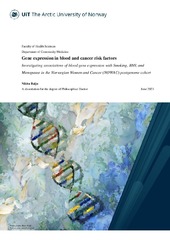| dc.contributor.advisor | Nøst, Therese Haugdahl | |
| dc.contributor.author | Baiju, Nikita | |
| dc.date.accessioned | 2023-10-04T10:44:19Z | |
| dc.date.available | 2023-10-04T10:44:19Z | |
| dc.date.embargoEndDate | 2025-10-24 | |
| dc.date.issued | 2023-10-24 | |
| dc.description.abstract | <p><i>Background:</i> Linking blood gene expression and common cancer risk factors represents an intriguing approach for gaining valuable biological insights. Smoking and obesity are important modifiable cancer risk factors. Menopause is also an important factor due to its impact on cancer risk. Still, there is limited or no research evaluating associations of blood gene expression profiles with these risk factors, particularly using large population-based samples.
<p><i>Aim:</i> We aimed to explore associations of blood gene expression and selected cancer risk factors –smoking, obesity, and menopause.
<p><i>Methods:</i> We utilized data from the NOWAC postgenome cohort, including gene expression profiles from whole-blood samples of 1,716 women and relevant information from questionnaires before and at the blood collection time point. We used gene-wise linear regression models to identify differentially expressed genes (DEGs), and functional enrichment analyses to determine their corresponding biological functions.
<p><i>Results:</i> We observed many genes related to current smoking and BMI, but fewer or no DEGs in relation to former smokers, smoking metrics, and past weight changes. LRRN3 was indicated as a potential biomarker for smoking exposure. Current exposures were reflected in blood gene expression more than past exposures (former smoking status, past weight changes). Many DEGs were associated with menopause and hormone therapy use, but when adjusted for estimated WBC proportions the number of DEGs was reduced. The biological functions of smoking-, BMI-, and menopausal-associated DEGs mainly revealed enriched terms like metabolic, immune, erythrocytes/reticulocytes related processes/functions.
<p><i>Conclusion:</i> This thesis demonstrates significant associations of blood gene expression with the investigated cancer risk factors; and emphasizes their systemic impacts. Smoking had the strongest associations, obesity the most, while associations with menopause were largely driven by the relative presence of blood cells. The knowledge of influence of blood cell compositions and molecular signals related to these cancer risk factors should be considered in future cancer studies. | en_US |
| dc.description.doctoraltype | ph.d. | en_US |
| dc.description.popularabstract | Studying how expression of genes is modulated in relation to common cancer risk factors can provide valuable biological knowledge. Important factors for cancer risk in women are smoking, obesity, menopause, and hormone therapy use. Still, research on how these risk factors is associated with gene expression in blood has been rare. We wanted to investigate such associations in a large study of 1,716 Norwegian women. The expressions of many genes were associated with current smoking and obesity, while few were observed for past smoking and weight changes. Menopause and hormone therapy use were associated with the expression of many genes, but cell compositions in the blood samples were likely influencing these associations. Overall, the biological functions of genes identified agree with known physiological effects of the respective factors. This thesis has contributed to knowledge of how gene expression in blood is associated with important factors for cancer risk. | en_US |
| dc.description.sponsorship | UiT The Arctic University of Norway | en_US |
| dc.identifier.uri | https://hdl.handle.net/10037/31426 | |
| dc.language.iso | eng | en_US |
| dc.publisher | UiT The Arctic University of Norway | en_US |
| dc.publisher | UiT Norges arktiske universitet | en_US |
| dc.relation.haspart | <p>Paper I: Baiju, N., Sandanger, T.M., Sætrom, P. & Nøst, T.H. (2021). Gene expression in blood reflects smoking exposure among cancer‑free women in the Norwegian Women and Cancer (NOWAC) postgenome cohort. <i>Scientific Reports, 11</i>, 680. Also available in Munin at <a href=https://hdl.handle.net/10037/21771>https://hdl.handle.net/10037/21771</a>.
<p>Paper II: Baiju, N., Rylander, C., Sætrom, P., Sandanger, T.M. & Nøst, T.H. Associations of gene expression in blood with BMI and weight changes among women in the NOWAC postgenome cohort. (Manuscript). Now published in <i>Obesity, 31</i>(9), 2023, 2417-2429, available in Munin at <a href=https://hdl.handle.net/10037/30706>https://hdl.handle.net/10037/30706</a>.
<p>Paper III: Baiju, N., Waaseth, M., Sætrom, P., Sandanger, T.M. & Nøst, T.H. Associations of blood gene expression profiles with menopausal status and hormone therapy use in the Norwegian Women and Cancer (NOWAC) postgenome cohort. (Manuscript). | en_US |
| dc.rights.accessRights | embargoedAccess | en_US |
| dc.rights.holder | Copyright 2023 The Author(s) | |
| dc.rights.uri | https://creativecommons.org/licenses/by-nc-sa/4.0 | en_US |
| dc.rights | Attribution-NonCommercial-ShareAlike 4.0 International (CC BY-NC-SA 4.0) | en_US |
| dc.subject | VDP::Medical disciplines: 700::Health sciences: 800::Community medicine, Social medicine: 801 | en_US |
| dc.subject | VDP::Medisinske Fag: 700::Helsefag: 800::Samfunnsmedisin, sosialmedisin: 801 | en_US |
| dc.subject | VDP::Medical disciplines: 700::Health sciences: 800::Epidemiology medical and dental statistics: 803 | en_US |
| dc.subject | VDP::Medisinske Fag: 700::Helsefag: 800::Epidemiologi medisinsk og odontologisk statistikk: 803 | en_US |
| dc.title | Gene expression in blood and cancer risk factors – Investigating associations of blood gene expression with Smoking, BMI, and Menopause in the Norwegian Women and Cancer (NOWAC) postgenome cohort | en_US |
| dc.type | Doctoral thesis | en_US |
| dc.type | Doktorgradsavhandling | en_US |


 English
English norsk
norsk

